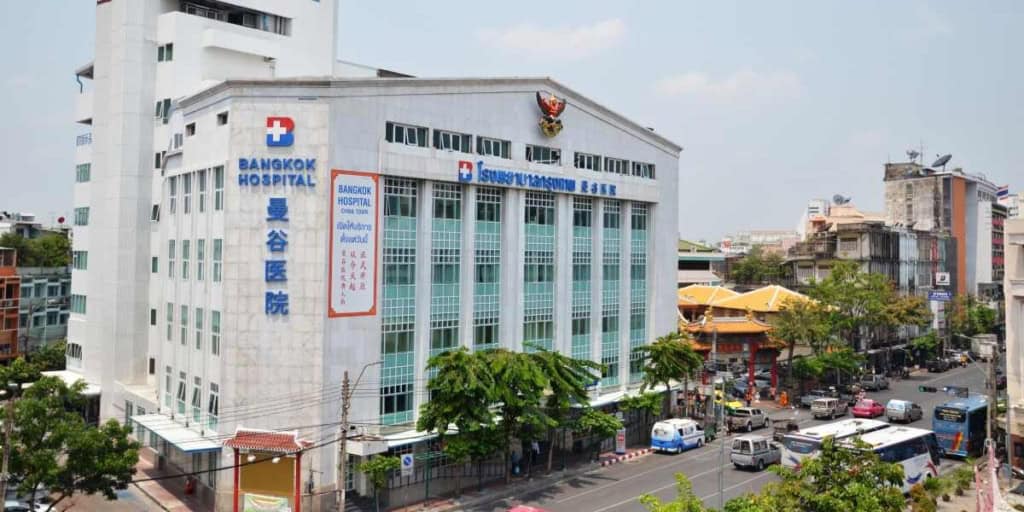International Health Insurance
Gain valuable insights and practical tips for navigating international health insurance while living abroad. From coverage details to expert advice, this comprehensive guide helps travelers…

International medical cover for expats and their families.
Medical and trip cancellation coverage for international travel.
Life insurance for globally mobile individuals living or working abroad.
Comprehensive international medical coverage for groups.
Medical, accident, and liability protection for global travel.
Financial protection for employees worldwide.
Most Popular Country Guides
Healthcare, insurance, and living insights to plan life and travel in each destination.
Healthcare, safety, and practical guidance for living abroad.
Tips and guidance for safer, smarter international travel.
Resources for global mobility, HR, and international teams.
Find the best travel insurance for Thailand for medical emergencies, trip cancellations, and more, plus top travel tips for a safe trip.


Thailand is a top destination renowned for its stunning beaches, ornate temples, and rich cultural heritage. To ensure your trip goes smoothly, it’s wise to purchase travel insurance before departure. The right policy can provide peace of mind, covering everything from medical emergencies to flight delays and lost baggage while you explore.
Learn all you need to know about travel insurance for Thailand, including what coverage to look for, how to choose a plan, and key travel tips to help you stay safe.

Travelers are not legally required to have travel insurance for Thailand, but it’s highly recommended, especially for medical coverage.
Although Thailand’s healthcare system is well-regarded, particularly its private hospitals, visitors must pay out of pocket for any medical treatment. While costs are generally lower than in many Western countries, bills can still add up quickly.
It’s important to consider what your coverage should include. Most trip insurance policies cover emergency medical treatment, loss or theft of belongings, baggage delays, and trip interruptions.
However, your individual needs are crucial when selecting insurance. For example, consider whether you need coverage for pre-existing medical conditions, the duration of your stay, and the activities you plan to engage in. Most basic policies won’t cover these, so choosing one tailored to your trip will give you greater peace of mind.
While travel insurance typically covers common travel disruptions, it’s essential to consider the specific risks you might face in Thailand, such as:

Here are the approximate costs for some medical situations in the country:

Travel insurance for Thailand typically covers key medical and travel-related risks, including treatment for tropical illnesses, injuries from everyday activities, emergency medical evacuation, trip cancellation or delay reimbursement, compensation for lost or delayed luggage, and repatriation of remains.
However, most policies exclude pre-existing medical conditions, injuries from high-risk activities like Muay Thai or scuba diving (unless you add an adventure sports rider), elective procedures, and incidents related to alcohol, drug use, or illegal activities.
Coverage details can vary by policy, so it’s important to carefully read the fine print to ensure the plan meets your specific needs.
Read more about the benefits of International Travel Insurance and how to find the ideal plan.

Follow Thai laws! Thailand enforces strict drug and alcohol laws. Possession or use of illegal drugs can lead to severe penalties, and alcohol-related offenses may result in legal trouble. Your insurance won’t cover injuries or legal costs arising from these incidents, so follow local laws during your trip.
Travel insurance for Thailand is generally affordable, although costs vary based on factors such as age, trip duration, coverage level, and whether you have pre-existing conditions or add coverage for high-risk activities like Muay Thai or scuba diving.
For example, a 25-year-old U.S. traveler visiting the country for 10 days might pay between $7 and $30 for a basic plan, while a 55-year-old traveler could expect to pay between $25 and $80.

With a wide range of plans available, you should be able to find one that fits your budget and coverage needs, whether you’re visiting for a short holiday or a more extended stay.

On a Budget? Consider choosing a plan with a higher deductible. Most insurers let you set this when requesting quotes. Just make sure your policy still covers essentials like emergency medical care, evacuation, repatriation, and trip cancellation, which is especially important for travel to Thailand.
Wondering, “What travel insurance do I need for Thailand?” With so many options available, choosing the right plan can feel overwhelming, but it doesn’t have to be.
Here are the key factors to consider when selecting a policy for your trip:

Shop Around! Carefully compare travel plans to find the best fit for your budget and travel needs. Coverage levels can vary significantly for expenses such as emergency medical care, trip cancellation, and lost luggage. Remember, the cheapest option isn’t always the best if it leaves you underinsured; ensure you get adequate protection tailored to your specific needs and Thai adventure.
Below are our top travel insurance recommendations, each tailored to cover a range of needs, including medical emergencies, trip protection, and more.
The IMG Patriot Platinum plan provides top-tier medical coverage, comprehensive global emergency services, and valuable travel benefits.
Whether you’re visiting Thailand for business, leisure, or long-term exploration, it provides one of the most comprehensive travel medical insurance options available.
U.S. citizens and non-U.S. citizens traveling to the country for less than 12 months can apply for the IMG Patriot Platinum plan.
The BCBS Global Solutions Single Trip Platinum Travel Insurance plan is an excellent option for U.S. citizens traveling to Thailand. Affiliated with Blue Cross Blue Shield, it provides access to a premium network of doctors and hospitals worldwide.
BCBS Global Solutions also offers 24/7 customer support, telemedicine, and prescription drug coverage. The plan is especially ideal for older U.S. citizens, as it provides the highest level of coverage for seniors traveling abroad.
With Trawick Safe Travels AnyReason, U.S. citizens and residents can visit Thailand with flexibility and financial protection against unexpected changes to their trip plans.
This plan offers one of the best Cancel for Any Reason (CFAR) benefits at no extra cost. Trawick will reimburse up to 75% of prepaid, non-refundable trip expenses if you cancel for reasons beyond standard covered events.
World Nomads Travel Insurance is a top choice for non-U.S. citizens seeking trip cancellation coverage for travel to Thailand. Policyholders can recover non-refundable expenses, such as flights, accommodations, and prepaid activities.
Beyond trip cancellation, World Nomads covers over 200 adventure activities common in Thailand, such as scuba diving, trekking, and Muay Thai boxing.
It also covers emergency medical expenses, evacuation, repatriation, and protection against loss or theft of belongings.

Moving to Thailand? International health insurance is a better option if you’re planning to stay in the country for a year or longer. These plans offer extensive benefits, including coverage for inpatient and outpatient medical care, as well as wellness, dental, and vision services. Moreover, they provide worldwide coverage, including your home country, ensuring seamless healthcare protection wherever you go.
Thailand is generally safe to visit, but it’s important to stay vigilant and prioritize your health and safety while you’re there.
The country’s tropical climate, vibrant cities, and diverse regions each present unique considerations for travelers.
By following the tips below, you’ll be well-prepared to handle common risks, understand local conditions, and ensure you have the right coverage for a safe and enjoyable trip.
Travelers don’t need to have specific vaccinations to enter Thailand. However, travelers should keep up to date on routine vaccinations.
This includes the vaccines for polio, chickenpox, measles-mumps-rubella (MMR), and diphtheria-tetanus-pertussis. Be sure to get your annual flu shot as well.

Since Thailand is a tropical region, vaccinations against common viral infections, including dengue, malaria, Zika, tuberculosis, chikungunya, and Japanese encephalitis, can also be helpful, especially if you plan to visit rural or forested areas. Anti-malarial medication may also be advised.
You can generally bring personal medications into Thailand, but quantities should not exceed a 90-day supply. Ensure you have sufficient medicines and medical equipment for the duration of your trip.
Many basic medications, such as aspirin, are available over the counter. However, if you rely on prescription medicines or prefer specific brands, it’s best to bring them with you. Keep prescription medicines in their original packaging and carry a copy of your prescription or a doctor’s note.
Be aware that medicines containing codeine require a special permit, so it’s best to avoid bringing these. Additionally, strict restrictions apply to prescription medications containing narcotics or psychotropic substances, so check regulations before you travel. You may be allowed to get a personal supply if you meet specific criteria.
Medical treatment is widely available in major cities like Bangkok, Chiang Mai, and Pattaya. While basic care is accessible in rural areas, the availability of English-speaking healthcare providers may be limited. Most trip insurance policies cover medical expenses up to a certain amount.
If you need medication during your trip, bring enough to last for the duration of your stay. Counterfeit medicines are common in Thailand, and some locally purchased drugs may be more potent or made differently than those in the U.S.
Thailand’s healthcare system is highly regarded and ranks sixth globally. The country launched its universal coverage program in 2002, providing subsidized medical treatment to all citizens.

Visitors and expatriates who don’t qualify for these programs should have private health insurance. Fortunately, many affordable plans are available, and private insurance is generally accepted at Thailand’s top private hospitals.
Many governments issue specific travel advisories for Thailand, offering important safety and travel advice to help visitors stay informed and protected.
Be sure to check these official sources for the most up-to-date information before and during your trip:
Unfortunately, emergencies can happen when traveling abroad. When they do, it is essential to know who to contact.
Keep the following emergency numbers handy, either saved on your phone or written on a piece of paper stored in a secure place.
All these numbers operate 24 hours a day, seven days a week.
In addition to local emergency services, it’s essential to have the contact details of your country’s embassy or consulate while traveling. They can assist with lost passports, legal issues, or other emergencies abroad.
Here are some of the main embassy phone numbers in Thailand:
So, is it safe to travel to Thailand? The short answer is yes. The country is generally safe to visit, but as with anywhere, it’s essential to pay attention to what’s happening around you. A little extra vigilance will ensure you avoid the most common risks travelers encounter in the country.
Pickpocketing and bag-snatching are the most common crimes tourists face in Thailand, especially in crowded tourist spots, markets, and on public transport like buses and trains.
For example, popular areas in Bangkok, such as Khao San Road or Chatuchak Market, can get very busy, making it easier for thieves to strike.
Always keep your bag zipped and close to your body, preferably in front of you. Avoid carrying large amounts of cash or valuables, and consider using a money belt or hidden pouch.
Thailand’s nightlife is vibrant, from rooftop bars in Bangkok to the famous Full Moon Parties on Koh Phangan. However, drink spiking has become increasingly concerning in bars, clubs, and large gatherings.
There have been reports of tourists waking up with little memory of the previous night or discovering their belongings missing after leaving drinks unattended.

Thailand has one of the highest rates of road accidents in Southeast Asia. Busy cities like Bangkok and tourist hotspots like Pattaya see a high number of motorcycle-car accidents.
When crossing streets, remember that traffic drives on the left, but chaotic traffic flow means you need to look both ways carefully.
If you rent or use motorcycle taxis, always wear a helmet and avoid riding at night or in adverse weather conditions. Pedestrians should use footbridges where available and avoid walking on busy roads.
While tap water in Thailand is treated and generally safe for brushing your teeth, it’s usually not recommended to drink directly from the tap.
Many locals and travelers prefer bottled or filtered water to avoid stomach upsets or waterborne illnesses.
To stay safe, always use bottled or purified water for drinking, making ice, and preparing food or beverages. Bottled water is widely available and affordable throughout the country, from convenience stores to restaurants and street vendors.
When ordering drinks, check that ice is made from filtered water, especially in rural areas or smaller towns where water quality can vary. Carrying a reusable water bottle with a built-in filter is also a smart option.

Thailand is a deeply respectful and traditional society, where customs and etiquette play a role in daily life.
The culture tends to be conservative, both in behavior and dress, so it’s essential to be mindful of local norms during your visit.
For instance, dress modestly, especially when visiting temples or religious sites. You’ll often need to cover your shoulders and knees to show respect.
These small acts of respect go a long way and help you avoid offending locals, making your trip more rewarding and enjoyable.

Thailand’s tropical climate means it’s hot and sunny year-round, with temperatures often soaring above 30°C (86°F). Heat exhaustion is common, particularly for individuals not accustomed to high humidity.
To stay safe, apply sunscreen with a high SPF regularly, wear a wide-brimmed hat or cap, and drink plenty of water throughout the day to keep hydrated.
Be especially mindful during the monsoon season, which typically runs from May to October. During this period, sudden heavy rains can cause flash flooding and muddy roads, potentially disrupting travel plans or outdoor activities.
Coastal areas may also be at risk of cyclones or tsunamis; therefore, always check local weather updates and follow the advice of authorities or your accommodation provider.
While most of Thailand is safe for tourists, some southern provinces, such as Yala, Pattani, and Narathiwat, and areas near the borders with Cambodia, Myanmar, and Malaysia have experienced political unrest and occasional violence.
It’s best to avoid traveling to these regions unless necessary. If you plan to visit, be sure to have comprehensive travel insurance that includes emergency evacuation and support in the event of unrest or protests.
Before your trip, regularly check travel warnings and alerts from your government or trusted sources. Staying informed helps you make safer decisions and avoid risky situations.
For instance, some travelers have been unexpectedly caught in protests or roadblocks that disrupt transportation and daily life.

Never Face a Crisis Alone! Many insurance providers offer 24/7 support to assist with emergency evacuations, legal help, or trip cancellations if you find yourself in the middle of protests, natural disasters, or other unforeseen events. By staying informed about local conditions and securing the right coverage, you can be confident that you have support in an emergency.
Thailand is an excellent destination, known for its friendly locals, breathtaking landscapes, vibrant cities, and rich cultural heritage.
Every year, millions of travelers visit the Land of Smiles and enjoy unforgettable experiences – and with just a bit of caution, you can too.
Whether you’re exploring the temples and street food of Bangkok, trekking through the mountains of Chiang Mai, or relaxing on the beaches of Phuket and Koh Samui, the country has something for every kind of traveler.
By staying alert, respecting local customs, and securing appropriate coverage, you can ensure your journey is not only memorable but also safe and stress-free.
Get a free quote now and find the best coverage for your Thai adventure!
